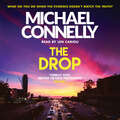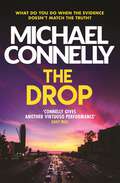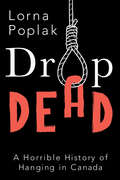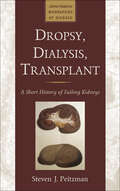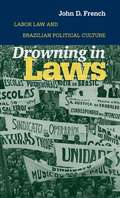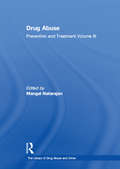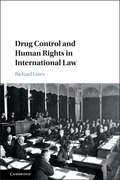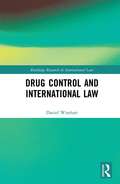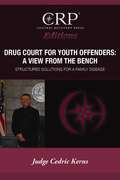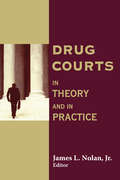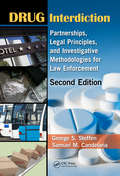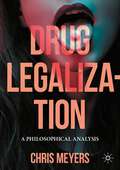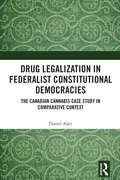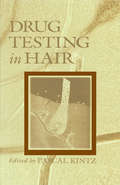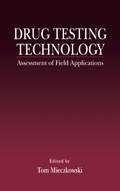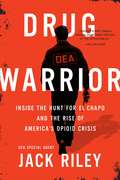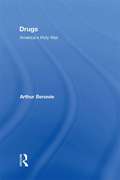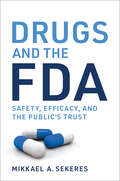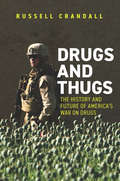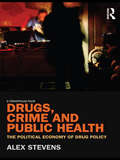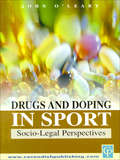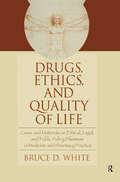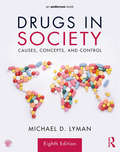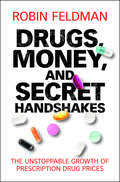- Table View
- List View
The Drop (Harry Bosch Series #15)
by Michael ConnellyWhen evidence links a brutal murder in 1989 to a convicted rapist named Clayton Pell, the case should be water-tight. Pell's DNA was found on the victim - but he was only eight years old at the time. This is not the only mystery Harry Bosch has to solve. A man jumped - or was pushed - from a window. The victim's father is Councilman Irving, who's been intent on destroying Harry's career for years. Now Irving wants Harry to head up the investigation. Harry uncovers traces of two of the city's deepest secrets: a killer operating for as many as three decades without being detected, and a conspiracy that goes back into the dark history of the police department...Read by Len Cariou(p) 2011 Hachette Audio
The Drop (Harry Bosch Series #15)
by Michael ConnellyIs it the end of the line for Harry Bosch? When evidence links a brutal murder in 1989 to a convicted rapist named Clayton Pell, the case should be watertight. Pell's DNA was found on the victim - but he was only eight years old at the time. This is not the only mystery Harry Bosch has to solve. A man jumped - or was pushed - from a window. The victim's father is Councilman Irving, who's been intent on destroying Harry's career for years. Now Irving wants Harry to head up the investigation. Harry uncovers traces of two of the city's deepest secrets: a killer operating for as many as three decades without being detected, and a conspiracy that goes back into the dark history of the police department . . .
Drop Dead: A Horrible History of Hanging in Canada
by Lorna PoplakShining a light on the dark history of hangings in Canada. Take a journey through notable cases in Canada’s criminal justice history, featuring well-known and some less-well-known figures from the past. You'll meet Arthur Ellis, Canada’s most famous hangman, whose work outfit was a frock coat and striped trousers, often with a flower pinned to his lapel. And you will also encounter other memorable characters, including the man who was hanged twice and the gun-toting bootlegger who was the only woman every executed in Alberta. <p><p> Drop Dead: A Horrible History of Hanging in Canada illustrates how trial, sentencing, and punishment operated in Canada’s first century, and examines the relevance of capital punishment today. Along the way, learn about the mathematics and physics behind hangings, as well as disturbing facts about bungled executions and wrongful convictions.
Dropsy, Dialysis, Transplant: A Short History of Failing Kidneys (Johns Hopkins Biographies of Disease)
by Steven J. PeitzmanSmall and bean shaped, the kidneys are sophisticated organs that filter waste from the blood. A number of diseases and disorders—including diabetes and hypertension—can harm the kidneys and cause them to fail.Historian and nephrologist Steven J. Peitzman traces the medical history of kidney disease alongside the personal experience of illness. Drawing on diaries, letters, literary narratives, and scientific writings, Peitzman charts the triumphs of medical innovators like Richard Bright, Thomas Addis, and Belding Scribner as well as the stories of persons, famous and not, who have struggled with the disease. Conditions once known as "Bright’s Disease" are now recognized as complex disorders with names such as glomerulopathy and acute tubular necrosis. Treatments have evolved from abdominal tapping and dietetics to hemodialysis and transplantation. Medical advances have improved the well-being and prognosis of persons with failing kidneys. Yet such persons continue on an arduous journey of chronic illness. Peitzman travels with them, from diagnosis to treatment, and witnesses their remarkable ability to cope.Joining the clinician’s perspective with the historian’s analysis, this fascinating chronicle offers insight into how diseases are defined, categorized, and understood and explains current concepts of how kidney disease behaves and how modern therapy works.
Drowning in Laws
by John D. FrenchSince 1943, the lives of Brazilian working people and their employers have been governed by the Consolidation of Labor Laws (CLT). Seen as the end of an exclusively repressive approach, the CLT was long hailed as one of the world's most advanced bodies of social legislation. In Drowning in Laws, John D. French examines the juridical origins of the CLT and the role it played in the cultural and political formation of the Brazilian working class.Focusing on the relatively open political era known as the Populist Republic of 1945 to 1964, French illustrates the glaring contrast between the generosity of the CLT's legal promises and the meager justice meted out in workplaces, government ministries, and labor courts. He argues that the law, from the outset, was more an ideal than a set of enforceable regulations--there was no intention on the part of leaders and bureaucrats to actually practice what was promised, yet workers seized on the CLT's utopian premises while attacking its systemic flaws. In the end, French says, the labor laws became "real" in the workplace only to the extent that workers struggled to turn the imaginary ideal into reality.
Drug Abuse: Volume III (The Library of Drug Abuse and Crime)
by Mangai NatarajanEver since the Shanghai convention in 1909, the threat posed to human well-being by drug abuse has led countries around the world to take action to deal with their drug problems. There are wide variations in the policies pursued, but most countries try to reduce both the supply of and the demand for drugs. Unfortunately, there is little research consensus on the respective merits of these two approaches or about the best ways to pursue them. Consequently, control and prevention policies are mostly driven by political considerations, economic realities and cultural expectations, though research has played an important part in formulating and evaluating treatments for drug addiction. This volume reviews studies on drug abuse prevention and treatment strategies under five main areas: 1. Reducing supply - strategies to control the flow of drugs from production to retail distribution; 2. Reducing demand - prevention of drug use at all stages of involvement and consumption levels; 3. Reducing harm - promoting situational risk reduction practices for regular users, addicts and recreational users; 4. Reducing addiction - drug treatment options for various groups in various settings; and 5. Drug policies and prescriptions - focused on debates about prohibition and legalization.
Drug Control and Human Rights in International Law
by Schabas Richard Lines William A. Richard Schabas LinesHuman rights violations occurring as a consequence of drug control and enforcement are a growing concern, and raise questions of treaty interpretation and of the appropriate balancing of concomitant obligations within the drug control and human rights treaty regimes. Tracing the evolution of international drug control law since 1909, this book explores the tensions between the regime's self-described humanitarian aspirations and its suppression of a common human behaviour as a form of 'evil'. Drawing on domestic, regional and international examples and case law, it posits the development of a dynamic, human rights-based interpretative approach to resolve tensions and conflicts between the regimes in a manner that safeguards human rights. Highlighting an important and emerging area of human rights inquiry from an international legal perspective, this book is a key resource for those working and studying in this field.
Drug Control and International Law (Routledge Research in International Law)
by Daniel WisehartThis book provides for an extensive legal analysis of the international drug control system in light of the growing challenges and criticism that this system faces. In the current debate on global drug policy, the central pillars of the international drug control system – the UN Drug Conventions as well as its institutions – are portrayed as outdated, suppressive and seen as an obstacle to necessary changes. The book’s objective is to provide an in-depth and positivist insight into drug control’s present legal framework and thus provide for a better understanding of the normative assumptions upon which drug control is currently based. This is attained by clarifying the objectives of the international drug control system and the premises by which these objectives are to be achieved. The objective of the current global framework of international drug control is the limitation of drugs to medical and scientific purposes. The meaning of this objective and its concrete implications for States’ parties as well as its problems from the perspective of other regimes of international law, most notably international human rights law, are extensively analysed. Additionally, the book focuses on how the international drug control system attempts to reach the objective of confining drugs to medical and scientific purposes, i.e. by setting up a universal system that exercises a rigid control on drug supply. The consequences of this heavy focus on the reduction of drug supply are outlined, and the book concludes by making suggestions on how the international drug control system could be reformed in the near future in order to better meet the existing challenges. The analysis occurs from a general international law perspective. It aims to map the international drug control system within a wider context of international law and to understand whether the problems that the international drug control system faces are exemplary for the difficulties that institutionalized systems of global scope face in the twenty-first century.
Drug Court for Young Offenders: A View from the Bench
by Cedric KernsWhat makes drug court programs different from traditional criminal courts? This e-book answers that question and details the model of Youth Offender (YO) Court, a unique family-focused drug court program designed to address the specific needs of young persons, ages 18 to 24, and their families-from the perspective of the presiding judge.
Drug Courts: In Theory and in Practice (Social Problems And Social Issues Ser. #14)
by Jr. NolanDrug courts offer offenders an intensive court-based treatment program as an alternative to the normal adjudication process. Begun in 1989, they have since spread dramatically throughout the United States. In this interdisciplinary examination of the expanding movement, a distinguished panel of legal practitioners and academics offers theoretical assessments and on-site empirical analyses of the workings of various courts in the United States, along with detailed comparisons and contrasts with related developments in Britain. Practitioners, politicians, and academics alike acknowledge the profound impact drug courts have had on the American criminal justice system. From a range of disciplinary perspectives, contributors to this volume seek to make sense of this important judicial innovation. While addressing a range of questions, Drug Courts also aims to achieve a careful balance between focused empirical studies and broader theoretical analyses of the same phenomenon. The volume maintains an analytical concentration on drug courts and on the important practical, philosophical, and jurisprudential consequences of this unique form of therapeutic jurisprudence.Drug courts depart from the practices and procedures of typical criminal courts. Prosecutors and defense counsel play much-reduced roles. Often lawyers are not even present during regular drug court sessions. Instead, the main courtroom drama is between the judge and client, both of whom speak openly and freely in the drug court setting. Often accompanying the client is a treatment provider who advises the judge and reviews the client's progress in treatment. Court sessions are characterized by expressive and sometimes tearful testimonies about the recovery process, and are often punctuated with applause from those in attendance. Taken together, the chapters provide a variety of perspectives on drug courts, and extend our knowledge of the birth and evolution of a new movement. Drug Courts<
Drug Interdiction: Partnerships, Legal Principles, and Investigative Methodologies for Law Enforcement, Second Edition
by George S. Steffen Samuel M. CandelariaAs drug trafficking and the abuse of illicit drugs continue to inflict untold harm upon our society, it is clear that a global initiative and an intense domestic strategy are vital to address the sophisticated drug trafficking organizations (DTOs) that are prevalent in many regions. Covering a wide array of domestic interdiction topics, Drug Interd
Drug Legalization: A Philosophical Analysis
by Chris MeyersThis textbook introduces students to the various arguments for and against the prohibition of recreational drugs. The arguments are carefully presented and analyzed, inviting students to consider the competing principles of liberty rights, paternalism, theories of punishment, legal moralism, and the social consequences of drug use and drug laws. Meyers extends this examination by presenting alternatives to the prohibition/legalization dichotomy, including harm reduction, decriminalization, and user licensing or on-premise use. The presentation invites readers to think clearly about the reasons and principles that should determine public policy and law, while also delving into the deeper philosophical questions underlying the drug prohibition debate. Is it morally wrong to use drugs? If so, would that be reason enough to make it illegal? Are there good reasons in favor of using illicit drugs? Do addicts lack free will, and if so, would it be unjust to punish them? What is (or ought to be) the purpose of punishment? Is the state justified in limiting the freedom of competent adults for their own good? What should be the goal of drug policy, reduced use or reduced harm?The purpose of the book is twofold. First, it is a review of the arguments for and against drug prohibition, a useful tool for policy makers, activists, and concerned citizens with an understanding of the relevant considerations for determining how we should reform our failing drug policy. Second, the book serves as a case study in the deeper issues of justice, the nature of law, rights and liberties, and the public good. Students studying applied ethics, political science, or public policy will benefit greatly from Meyers' approach.
Drug Legalization in Federalist Constitutional Democracies: The Canadian Cannabis Case Study in Comparative Context
by Daniel AlatiThis book uses the Canadian Cannabis legalization experiment, analyzed in the historical context of wider drug criminalization in Canada, and placed in international perspective, to examine important lessons about the differential implementation of federal law in jurisdictions within federalist constitutional democracies. Utilizing a socio-legal, interdisciplinary methodology, the work provides a comprehensive history of federal drug policy and engages in a critical appraisal of its provincial implementation. It also presents a significant international and comparative component, bringing in analyses of the status of drug legalization in other federalist constitutional democracies. Readers of the book will thus gain a comprehensive knowledge of drug legalization in federalist constitutional democracies. They will also better understand the political and cultural factors that impact upon differential implementation of federal law in individual jurisdictions including, but not limited to, legacies of racism and stigmatization of drug use. Using the experience of Canada and other countries, future challenges and lessons to be learned for states considering federal drug legalization are analysed and explained. The book will be a valuable resource for students, academics and policy-makers in the areas of Criminal Law, Constitutional Law, Criminology, Socio-Legal Studies, Indigenous Studies, and Drug and Health Policy Studies.
Drug Testing in Hair
by Pascal KintzDrug Testing in Hair is the first book on this timely and controversial topic. The book's purpose is to validate hair testing as an accepted form of evidence for use in courts and elsewhere, such as the military and the workplace. This volume presents the most recent experiments and clinical applications to provide missing information and insight into the unanswered questions of hair testing.Active researchers working in hair testing have contributed chapters to this book. New data, never before published, are incorporated into the text, so the reader receives cutting-edge information from experts in the field. This is must-have information on everything you need to know about drug testing in hair.
Drug Testing Technology: Assessment of Field Applications
by Tom MieczkowskiCovering a wide range of research currently being done in drug analysis, Drug Testing Technology: Assessment of Field Applications compares and evaluates various methods used to determine abused drugs taken by individuals, and their application in various programs and contexts. Controversies associated with various methods, including urine analysis and hair analysis, are examined. Contributors from a wide diversity of disciplines offer advanced knowledge, encompassing work which is technical as well as markedly philosophical. Chapters provide overviews of drug incorporation into hair; the use of hair analysis for compliance measurement in the use of anti-epileptic medications; and the application of drug testing to the psychiatric treatment of substance abuse disorders. Drug Testing Technology: Assessment of Field Applications provides information useful in medical applications, workplace testing, criminal justice monitoring community epidemiology, and drug treatment assessment.
Drug Warrior: Inside the Hunt for El Chapo and the Rise of America's Opioid Crisis
by Mitch Weiss Jack RileyDEA Agent Jack Riley, "[Chicago's] most famous federal agent since the days of The Untouchables" (-Rolling Stone) tells the inside story of his 30-year hunt for the drug kingpin known as El Chapo, and reveals the true causes of the American opioid epidemic. Jack Riley, grandson of a Chicago cop known for using his fists, was born to be a drug warrior. Joaquín "El Chapo" Guzmán Loera, who farmed marijuana and opium poppies as a teenager in Mexico, was born to be a drug lord. Their worlds collided when Riley, a career special agent with the Drug Enforcement Administration, was promoted to lead the fight against Chapo on the border at El Paso.Drug Warrior is the story of Riley's decades-long hunt for the world's most wanted drug lord, set against the rise of modern international drug trafficking, and America's spiraling opioid epidemic. Jack Riley started his career as an undercover street agent in Chicago busting small-time dealers. By the time he worked his way up to second in command of the DEA-a post few field agents ever reach-he had overseen every major mission to capture foreign drug kingpins since the 1990s, and had witnessed first-hand how El Chapo changed the game. As brilliant as he was lethal, Chapo not only decimated his competition, he foresaw Americans' dependence on opioids and heroin, and manipulated supply to increase demand. Riley's story culminates as he and the DEA win their greatest victory-the capture and extradition of his long-time nemesis-and Chapo faces his darkest fear: U.S. justice. A riveting memoir of life inside the drug wars, and a never-before-seen glimpse of the inner-workings of the DEA, Drug Warrior is a critical examination of how America's opioid crisis came to be, and the extraordinary people fighting it.
Drugs: America's Holy War
by Arthur BenavieUsing the best scientific evidence, Drugs: America's Holy War explores the impact and cost of America's "War on Drugs" - both in tax spending and in human terms. Is it possible that US drug policies are helping to proliferate, not prevent, a multitude of social ills including: homicide, property crime, the spread of AIDS, the contamination of drugs, the erosion of civil liberties, the punishment of thousands of non-violent people, the corruption of public officials, and the spending of billions of tax dollars in an attempt to prevent certain drugs from entering the country? In this controversial new book, award-winning economist Arthur Benavie analyzes the research findings and argues that an end to the war on drugs, much as we ended alcohol prohibition, would yield enormous international benefits, destroy dangerous and illegal drug cartels, and allow the American government to refocus its attention on public well-being.
Drugs, Addiction, And The Law: Policy, Politics, And Public Health
by Peter J. CohenAmerican physician and attorney Cohen discusses legal, ethical, and policy considerations faced by society as it deals with psychoactive drug use. A recurring theme is the need to balance individual liberty and autonomy with the needs of society. None of the several models that have been devised to that end is completely satisfying, he says, and all of them raise important questions. The book cites legislation and court decisions extensively.
Drugs and the FDA: Safety, Efficacy, and the Public's Trust
by Mikkael A. SekeresHow the FDA was shaped by public health crises and patient advocacy, told against a background of the contentious hearings on the breast cancer drug Avastin.Food and Drug Administration approval for COVID-19 vaccines and the controversial Alzheimer&’s drug Aduhelm made headlines, but few of us know much about how the agency does its work. Why is the FDA the ultimate US authority on a drug&’s safety and efficacy? In Drugs and the FDA, Mikkael Sekeres—a leading oncologist and former chair of the FDA&’s cancer drug advisory committee—tells the story of how the FDA became the most trusted regulatory agency in the world. It took a series of tragedies and health crises, as well as patient advocacy, for the government to take responsibility for ensuring the efficacy and safety of drugs and medical devices. Before the FDA existed, drug makers could hawk any potion, claim treatment of any ailment, and make any promise on a label. But then, throughout the twentieth century, the government was forced to take action when children were poisoned by contaminated diphtheria and smallpox vaccines, an early antibiotic contained antifreeze, a drug prescribed for morning sickness in pregnancy caused babies to be born disfigured, and access to AIDS drugs was limited to a few clinical trials while thousands died. Sekeres describes all these events against the backdrop of the contentious 2011 hearings on the breast cancer drug Avastin, in which he participated as a panel member. The Avastin hearings, he says, put to the test a century of the FDA&’s evolution, demonstrating how its system of checks and balances works—or doesn&’t work.
Drugs and Thugs: The History and Future of America's War on Drugs
by Russell C. CrandallA sweeping and highly readable work on the evolution of America&’s domestic and global drug war How can the United States chart a path forward in the war on drugs? In Drugs and Thugs, Russell Crandall uncovers the full history of this war that has lasted more than a century. As a scholar and a high-level national security advisor to both the George W. Bush and Obama administrations, he provides an essential view of the economic, political, and human impacts of U.S. drug policies. Backed by extensive research, lucid and unbiased analysis of policy, and his own personal experiences, Crandall takes readers from Afghanistan to Colombia, to Peru and Mexico, to Miami International Airport and the border crossing between El Paso and Juarez to trace the complex social networks that make up the drug trade and drug consumption. Through historically driven stories, Crandall reveals how the war on drugs has evolved to address mass incarceration, the opioid epidemic, the legalization and medical use of marijuana, and America&’s shifting foreign policy.
Drugs, Crime and Public Health: The Political Economy of Drug Policy
by Alex StevensDrugs, Crime and Public Health provides an accessible but critical discussion of recent policy on illicit drugs. Using a comparative approach - centred on the UK, but with insights and complementary data gathered from the USA and other countries - it discusses theoretical perspectives and provides new empirical evidence which challenges prevalent ways of thinking about illicit drugs. It argues that problematic drug use can only be understood in the social context in which it takes place, a context which it shares with other problems of crime and public health. The book demonstrates the social and spatial overlap of these problems, examining the focus of contemporary drug policy on crime reduction. This focus, Alex Stevens contends, has made it less, rather than more, likely that long-term solutions will be produced for drugs, crime and health inequalities. And he concludes, through examining competing visions for the future of drug policy, with an argument for social solutions to these social problems.
Drugs & Doping in Sports
by John O'LearyDoping is undoubtedly one of the most controversial issues within sport. Doping scandals wreck the careers of sportsmen and women,they can bankrupt governing bodies, infringe personal liberties, threaten livelihoods, tarnish images, galvanise the European Union, undermine the Olympic Movement and invoke invective from politicians. In recent years, sports law has developed into one of the most exciting and challenging legal disciplines and the importance of the law in doping matters has been heightened by the influx of money into sport and the development of sport as a global economy. Drugs and Doping in Sport brings together work from leading academics, practitioners and administrators, analyses contemporary socio-legal and political themes related to doping in sport. It provides a challenging and often controversial view of doping issues and confronts political and legal orthodoxy, supplying the reader with a unique insight into this fascinating area of academic study.
Drugs, Ethics, and Quality of Life: Cases and Materials on Ethical, Legal, and Public Policy Dilemmas in Medicine and Pharmacy Practice
by Bruce D. WhiteWeigh pivotal healthcare ethics, law, and public policy issues that resulted in tipping-point legal actionsWeighing the ethical considerations in healthcare and drug issues can be emotionally difficult and mentally challenging. Drugs, Ethics, and Quality of Life: Cases and Materials on Ethical, Legal, and Public Policy Dilemmas in Medicine and Pharmacy Practice is a fascinating casebook that clearly discusses the most contentious ethical conflicts that resulted in legal actions. This easy-to-read text provides all sides of controversial real-life cases that provoke spirited debate while teaching the fundamentals of pharmacy law and ethics. The book is a unique exploration into the basic principles of bioethics, end of life care, and drug research. Drugs, Ethics, and Quality of Life explains in detail the concepts of ethics, quality of life, beneficence, nonmaleficence, autonomy, and justice. Recent cases provide illuminating backdrops for the exploration of these concepts, making them easily understood. A special introduction includes important information about ethics and the pharmaceutical code of ethics. Two appendixes provide further opportunities for discussion and the examination of law and decisions, and resources about drug use decisions and situations. This thought-provoking textbook plainly shows the crucial role ethics plays in today&’s society. Ethical topics explored in Drugs, Ethics, and Quality of Life includes legal cases on: tobacco COX-2 inhibitors medical marijuana the "morning after" pill and other emergency contraceptives pain medications and palliative care drugs physician-assisted suicide drug use in medically futile situations gene therapy Drugs, Ethics, and Quality of Life is valuable, insightful reading as well as a good adjunct text for pharmacy students, pharmacists, medical students, physicians, bio
Drugs in Society: Causes, Concepts, and Control
by Michael D. LymanDrugs in Society: Causes, Concepts, and Control, Eighth Edition, focuses on the many critical areas of America's drug problem, providing a foundation for rational decision-making within this complex and multidisciplinary field. Lyman offers a comprehensive big-picture examination of the US drug problem, dealing with drugs, abusers, drug enforcement, and public policy. Organized in three sections: Understanding the Problem, Gangs and Drugs, and Fighting Back, topics covered include the business of drugs and the role of organized crime in the drug trade, drug legalization and decriminalization, legal and law enforcement strategies, an analysis of the socialization process of drug use and abuse, and a historical discussion of drug abuse that puts the contemporary drug problem into perspective. Suitable for upper-level undergraduates in Criminal Justice, Criminology, and related programs, Drugs in Society, Eighth Edition, uses logical organization and strong pedagogy (case studies, focused text boxes with related information, critical thinking tasks) to support learning objectives.
Drugs, Money, and Secret Handshakes: The Unstoppable Growth of Prescription Drug Prices
by Robin FeldmanIn the warped world of prescription drug pricing, generic drugs can cost more than branded ones, old drugs can be relaunched at astronomical prices, and low-cost options are shut out of the market. In Drugs, Money and Secret Handshakes, Robin Feldman shines a light into the dark corners of the pharmaceutical industry to expose a web of shadowy deals in which higher-priced drugs receive favorable treatment and patients are channeled toward the most expensive medicines. At the center of this web are the highly secretive middle players who establish coverage levels for patients and negotiate with drug companies. By offering lucrative payments to these middle players (as well as to doctors and hospitals), drug companies ensure that inexpensive drugs never gain traction. This system of perverse incentives has delivered the kind of exorbitant drug prices - and profits - that everyone loves except for those who pay the bills.
